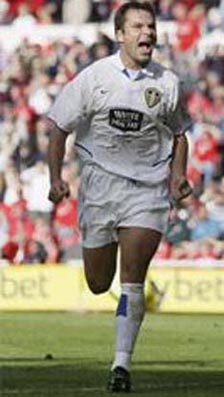

Viduka: Marko Anthony (Mark)
2000-2004
(Player Details)
Centre Forward
Born: Melbourne, Australia: 09-10-1975
Debut: TSV Munich 1860 (h): 09-08-2000
6’2” 14st 4lb (2007)
#19 in 100 Greatest LUFC Players Ever

Viduka, affectionately known as "Big Dukes", started his career in Australia with the
Melbourne Knights in 1993, and became an Australian international in June of the following
year. In his two seasons with the Melbourne Knights he was top goal scorer in the NSL and
was twice awarded the Johnny Warren Medal for NSL Player of the Year in 1993/94 and 1994/95.
Viduka's time at the Melbourne Knights included one NSL title in season 1994/1995. In 1995
he moved to Croatia to play with Croatia Zagreb (now Dinamo Zagreb). The grandstand at
Knights' Stadium, home of the Melbourne Knights was renamed the Mark Viduka Stand in his
honour and paid for with his transfer money. He spent three and half seasons with the club,
helping them to win three "Doubles" in Croatia between 1996 and 1998. He was also part of the
Croatia Zagreb team that reached the Third Round of the UEFA Cup in 1997 and went on to make
his ECL group stage debut with the club a year later. After he had scored forty goals in
seventy starts in League competition and six substitute appearances as well as two appearances
in European competition for Zagreb, Celtic bought Viduka in December 1998 for £3.5 million. He
was voted Scottish Player of the Year for 1999-2000 after scoring twenty-seven goals in his
first full season at Celtic Park. He was regarded as a skilled player, able to hold the ball
up well and bring other players into the game. Leeds United Manager David O’Leary signed Viduka
just before the 2000-01 season for £6 million. With Celtic he scored thirty League goals from
thirty-six starts and one game from the bench, as well as four goals in seven games in the Cup
competitions and one goal in four European games. At Leeds he was expected to line up in a
three-pronged attack alongside Harry Kewell and Michael Bridges, but injuries to those two saw
him form a partnership with Alan Smith in Leeds’ ECL matches, while Robbie Keane also benefited
in their EPL matches together. In his first season at Elland Road, Viduka scored twenty-two
goals, including all four in a memorable 4–3 win over Liverpool at Elland Road. He signed a
five-year deal in the summer of 2001. In the 2002-03 campaign Viduka scored another twenty-two
goals, however Leeds' off-pitch financial troubles forced the club to sell key players,
including Harry Kewell and Robbie Keane. This prompted speculation that Viduka would join the
Leeds exodus with Barcelona confirming their interest in the Australian international along
with Premiership clubs Liverpool and Manchester United. With the relegation of Leeds United to
the CCCL, the sale of Viduka to Middlebrough was completed. Viduka's debut season at
Middlesbrough was initially impressive, albeit frustrated by injuries. In the 2005-06 season
however, Viduka was in sensational form in all competitions for Middlesbrough, reaching double
figures early on in the season. He also played an important part in spearheading
Middlesbrough's campaign in the UEFA Cup where they twice had to score four goals in a game to
proceed. They eventually lost in the final to Spanish side Sevilla on 10th May 2006. With his
contract due to expire at the end of the 2006-07 season, Middlesbrough manager Gareth Southgate
expressed his interest in keeping Viduka. In August 2006, he was awarded the number nine shirt
at Middlesbrough, his preferred number at all his previous clubs. Following another successful
season, in which he scored twenty-one goals, Viduka attracted interest from other clubs who
were hoping to sign him on a free transfer as he became out-of-contract. Southgate reiterated
his wish to retain Viduka's services and revealed he would offer him a new contract. However
Viduka joined North-East rivals Newcastle United on a free-transfer on 7th June 2007. He scored
twenty-six goals in fifty-six League starts and another sixteen games from the bench, while in
the Cup competitions he scored eight goals from sixteen games, including three from the bench
and a further eight goals from eleven starts and three from the bench in European competition.
In signing for Newcastle United, Viduka became Manager Sam Allardyce's first signing at the club.
His contract was for two years, with the option of a third year. He made his Newcastle debut in
a Premiership match at Bolton Wanderers on 11th August 2007 and scored his first goal for
Newcastle on 26th August 2007 against his former club Middlesbrough. In an injury-riddled season
Viduka scored seven goals in nineteen starts and seven games from the bench in League competition
and two starts in the FA Cup in the 2007-08 season. After an injury lay off over the New Year,
Viduka was brought back into the side by new Manager Kevin Keegan, where he played as part of a
4-3-3 formation along with Michael Owen and Obafemi Martins. This new formation brought about a
change of fortune for Newcastle, as the three strikers rescued them from a relegation battle,
with Viduka scoring two more goals over the rest of the season and setting up others for Martins
and Owen before picking up an Achilles injury before the last game of the season. He was missing
for six months but returned as a substitute against his former club Middlesbrough on 29th
November 2008, after fears that his career might end prematurely. Another injury followed in
late December, this time it was a groin injury, which prompted Viduka to assert that he was
not looking to retire and had an option beyond the current season. With Viduka absent Newcastle
had a form slump and when he had recovered Alan Shearer rushed him back into the team in its
fight against relegation. He gave a man of the match performance in a 3-1 victory over
Middlesbrough and had a goal disallowed against Fulham, but in the end Newcastle were relegated.
He was released by Newcastle and was linked with a number of clubs but in the end he decided to
return to Australia to live but did not join an A-League club. He was at Newcastle for two
seasons which were blighted by injury and he scored seven League goals in twenty-five starts and
thirteen appearances from the bench and also made two starts in the F.A. Cup. He captained the
Australian National team from September 2005, after taking over from the injured Craig Moore.
Viduka thrived under Guus Hiddink's tenure as coach of the national squad and led Australia as
it qualified for the 2006 World Cup Finals in Germany for the first time in thirty-two years
that Australia qualified to participate in the event. On 21st May 2006 he was named as the
Australian captain for the World Cup. He also led Australia's national team to their first
World Cup Finals victory with a 3–1 win over Japan in June 2006, as well as guiding them
through an encounter with Brazil, losing 2–0, and a controversial meeting with Croatia, which
ended in a 2–2 draw. He led Australia into the second round, where they narrowly lost to Italy.
Although a regular scorer in the EPL, Viduka had struggled to score any significant goals for
the Socceroos, and the 2006 World Cup was no different. Viduka considered retiring from
international competition after the 2006 World Cup, citing increasing family commitments as the
primary reason. However, in September 2006 he confirmed that he would continue playing for
Australia and intended to compete in the 2007 Asian Cup. On Australia's first ever Asian Cup
participation, Viduka captained the side and he scored their solitary goal against Iraq, a
game which they ultimately lost 1–3. In the next match he scored two goals against co-host
team Thailand, defeating them 4–0. At one stage he led the goalscoring at the Asian Cup
tournament, although his team was eliminated in the quarter-finals in a penalty shootout
against Japan. It was not known whether he will continue his international career. Two years on
from the 2007 Asian Cup, he had still not made an appearance for Australia citing injuries or
club commitments. He missed the World Cup Qualifiers against Qatar, Bahrain, and Japan, even
though fully fit and was not selected in the final squad for the 2010 FIFA World Cup.